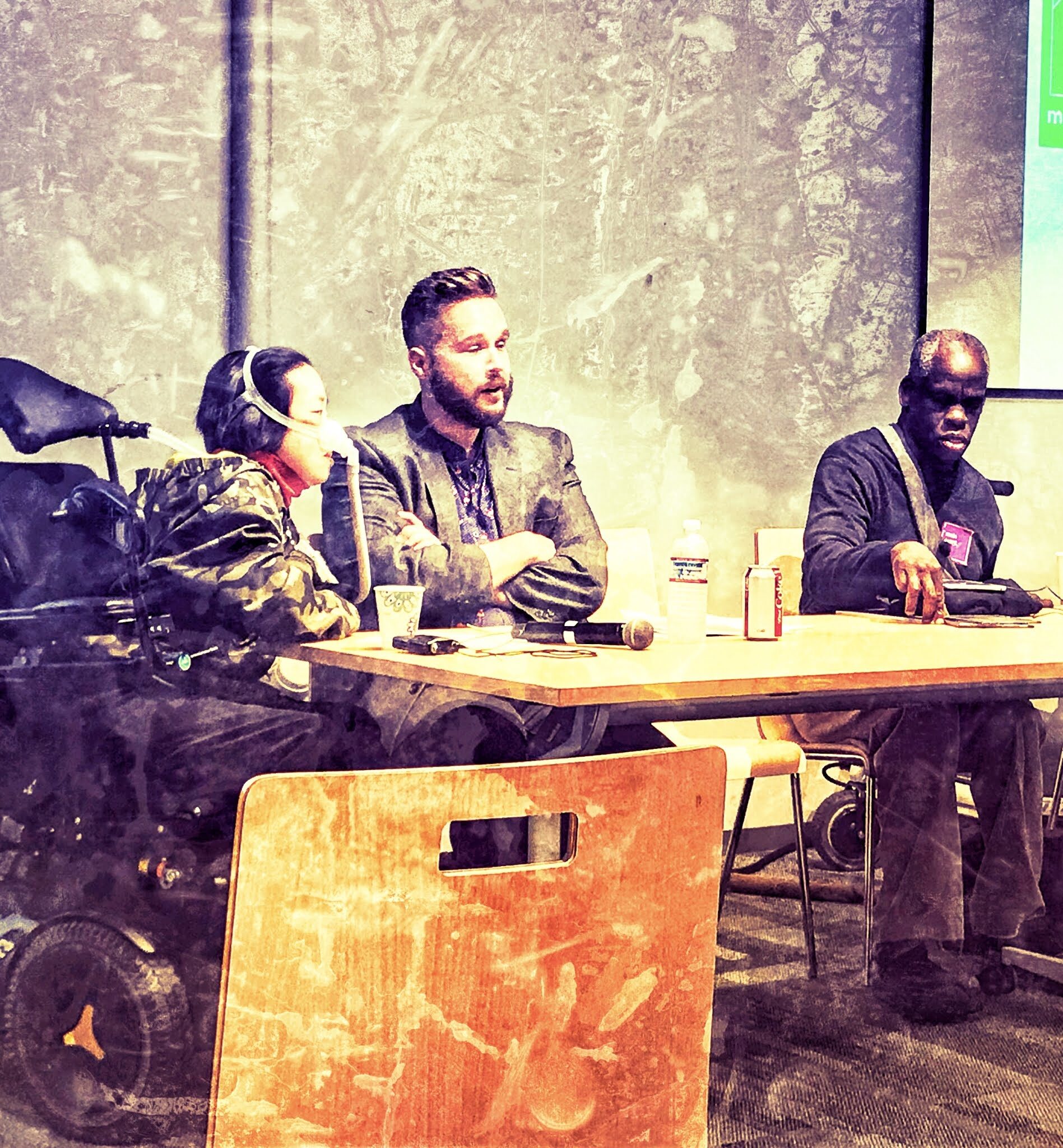Alice Wong, John Marble, and Leroy Moore [image: Stylized photo of an Asian-American woman with bobbed black hair, a motorized wheelchair, and a bipap mask; a white man with brown hair in an undercut and a mustache & beard; and a Black man with very short gray hair.] There are few better ways to spend the evening than at an event for inclusive housing initiative The Kelsey, in celebration of the 20th anniversary of the Olmstead decision—”the most important civil rights decision for people with disabilities in our country’s history“—with an amazing panel of disability advocates: Alice Wong, John Marble, Leroy Moore, and Micaela Connery. We were lucky enough to do just that last night, and now we’ll share what we learned with in this lightly edited transcript of our live-tweeted coverage of the event. Listening to Alice Wong of Disability Visibility Project talk (with a dash of salt) about…
Tag: housing
Shannon Des Roches Rosa squidalicious.com Leo making me make fart noises, because that is never not funny to him. [image: Photo of the author’s teen son squeezing her cheeks so she will make a raspberry sound with her mouth. Both are wearing hats, outdoors.] Last week my son Leo and I had a pleasant arm-in-arm walk* around a fancy shopping center while his sibling was at an appointment. We strolled past the coin collector’s shop and the jodhpurs boutique, then popped into the housewares store—just in case they had any unintentionally awesome fidget toys (which, being gadget central, of course they did). Finding delight in utilitarian objects is part of what being autistic means for my son. Another part is being a traveling one-person party. I go with his flow, as long as he’s not being disruptive. So as we wound our way past the store’s racks of remarkably specialized cooking…
Spectrum Disordered www.facebook.com/asdisordered We’ve all heard or experienced horror stories about accessing services and supports. Often the idea of receiving services for people with intellectual and developmental disabilities (I/DD), including autism, conjures up images of institutions—visions of Willowbrook. Or, ideas of what is “optimal” for us look like segregated lives, or “intentional” communities where the true intent is to lump us together under the guise of “keeping us safe.” Regularly, the idea of seeking supports to live in one’s daily life carries an expectation that the cost will be any and all independence and autonomy in having positive control over that life. These fears are rooted in fact and truth, both of how things were and in some cases, continue to be. But that does not mean they are a universal truth! There are a lot of really great disability support providers out there! Unfortunately, there are also plenty of…
Sara Luterman www.NosMag.org Sara Luterman [image: Headshot of a smiling white person with short dark hair & glasses.] Recently, Amy Lutz, a parent advocate, wrote an opinion piece for Spectrum News titled, Adults with disabilities deserve the right to choose where to live. I wholehearted agree with that sentiment. Unfortunately, the article that follows argues nothing of the kind. It is, in fact, an argument to return people with developmental and intellectual disabilities to institutions. These new institutions have organic-biodynamic farms, swimming pools, and fluffy pillows. They are, however, still secluded and subject to all of the abuses of Willowbrook and Pennhurst. Amy Lutz and others who mask new institutions as a “choice” do not draw a healthy or appropriate distinction between themselves and their own children. When they say, “adults with disabilities deserve the right to choose,” they mean is that their opinions are their children’s opinions. They do not…
Shannon Des Roches Rosa www.squidalicious.com Photo © Jeffrey Beall | Flickr / Creative Commons [image: Photo of metal letters spelling “Science” affixed to a brick wall.] At a recent workshop on How to Find Autism Information That Will Help You, I noted that a key factor for evaluating an autism resource is: Who does the approach primarily benefit? Autistic people themselves, or people affiliated with autistic people, such as families or teachers? It’s important to identify this aim, because approaches that support autistic people in living lives of maximized happiness and potential can be very different from the parent-centered approaches—which too often portray autistic people as problems to be managed and controlled. We at Thinking Person’s Guide to Autism support the helping approach, and routinely criticize the problem/control approach—an ongoing effort as the latter remains pervasive both in popular culture, and in research. The problem/control approach is also a theme…
Housing for autistic adults is a fraught and confusing topic. We talked with Sam Crane, who explains why group homes can be bad for disabled residents, and why “intentional” housing often means just the opposite for the disabled people who actually live there.
Kit Mead kpagination.wordpress.com Photo: Mike Wilson. Creative Commons license. [image: White paper houses with different colored doors & windows.] Introduction Less than a month after I wrote a blog post on the media misrepresentation of Autistic people like me, I’ve gotten wind of yet another case of journalism that misrepresents Autistic people – and in this case, community living too. The article is courtesy of Rolling Stone and the Atlantic reprinted it. I could link to it, but it’s one of the top results if you google “Rolling Stone autism.” Here are the two main premises of the article: High support autistic people can’t live fully in the community. But group homes cost too much. We should fund farm-based settings instead. The Medicaid settings rule in 2014 that declared most farms and compounds for disabled people segregated settings ruined many parents’ hopes and dreams. So… it’s unethical (because it is…
Clarissa Kripke, MD, FAAFP odpc.ucsf.edu In this important talk for anyone concerned about their, or their child’s, long-term living arrangements and supports, Dr. Clarissa Kripke explores progress made in community living for people with developmental disabilities. She explains how California’s Lanterman Act has been enormously successful by establishing an entitlement to community-based services and supports for people with developmental disabilities of all age, and how those services work. She also discusses specific successful cases, and clears up misconceptions about which housing models work best — both financially, and for quality of life. I’m the Mom of an Autistic teen. Of course I want what’s best for him. I want him to have opportunity, stability, care, and respect. After trying to learn everything I could, I realized that wanting what’s best, and knowing how to achieve it, are two different things. Fortunately, we live in California. The Lanterman Act was developed…




